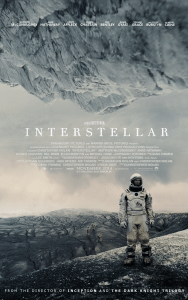 Interstellar, Christopher Nolan’s latest big, long, important science fiction epic, endeavors to be part Kubrick, part Spielberg, and fails at both. Interstellar wants to be everything to everyone, often in the same scene. It’s full of hard science, but relies on dreamy metaphysics. Its characters are brilliant scientists, except when the plot requires they act like dopes. It’s filled with the majesty of space, but no one seems especially wowed. It idealizes sacrifice and intelligence, but its lead is selfish and lucky. It’s a strange viewing experience. Parts of it are very good, but on the whole, I can’t say I liked it much.
Interstellar, Christopher Nolan’s latest big, long, important science fiction epic, endeavors to be part Kubrick, part Spielberg, and fails at both. Interstellar wants to be everything to everyone, often in the same scene. It’s full of hard science, but relies on dreamy metaphysics. Its characters are brilliant scientists, except when the plot requires they act like dopes. It’s filled with the majesty of space, but no one seems especially wowed. It idealizes sacrifice and intelligence, but its lead is selfish and lucky. It’s a strange viewing experience. Parts of it are very good, but on the whole, I can’t say I liked it much.
You should probably see it.
Nolan takes movies seriously, and Interstellar, which he wrote with his brother, Jonathan Nolan, is a serious movie. It’s shot on film, many parts in IMAX (when you see it, see it in an IMAX theater), it’s got some big ideas, some exciting visuals, and some solid performances. It’s just not very good.
Nolan is looking to explore the kind of “next step in human evolution” ideas powering Kubrick’s 2001: A Space Odyssey, but he shies away from letting the visuals do the talking. Instead of shooting humanity to Jupiter and beyond, he shoots them to Saturn and beyond, but keeps cutting back to the people left behind on Earth, namely Murphy and Tom, the children of hotshot space pilot Cooper (played by Matthew McConaughey as a laconic, midwest tough guy with a soft streak, a big brain, and an even bigger heart (awww)), and Professor Brand (Michael Caine), leader of the NASA team on the ground and father of one of the astronauts, Amelia (Anne Hathaway).
Continually returning to Earth is the biggest drag on the story. The strangest example being the intercutting of two sequences late in the film, one on Earth, the other in deepest space, that have no business being together. The Earth half isn’t interesting, and the space half, where the action is, doesn’t work with the constant interruptions.
But I’m way ahead of myself. The story is set sometime in the future, maybe 40 or 50 years from now. The Earth is drying out and dying. There are no more wars because everyone everywhere is starving, and almost every crop is extinct, save corn. Cooper is a farmer, though he used to be a hotshot pilot. You know, until the accident. But we don’t talk much about that no more. His hometown is beset by massive dust storms.
His young kids help on the farm and endure a school where they’re taught the moon landing was a publicity stunt to bankrupt the Russians. His daughter, Murphy (Mackenzie Foy (which by the way, what’s the deal with girls’ first names? They’re all last names now?)), is a budding scientist, yet believes a ghost haunts her bedroom. Books leap from shelves and, during a dust storm, the dust settles on her floor in strange lines. Coop takes a long look and says, “Gravity.” Paging M. Night Shamamalam!
Most of the science in Interstellar is delivered this way, with a word or two. Why is gravity causing dust to make lines on bedroom floors? Easy: it’s an anomaly. One that’s a binary code for map coordinates leading Cooper and young Murphy to the secret, underground headquarters of NASA. Banished by a public uninterested in the grand wonders of space, NASA must save the human race in secret.
In no time, Professor Brand explains to Coop that he’s working on a magical gravity equation to carry everyone on Earth off the planet, into space, through the mysterious wormhole the aliens left hovering next to Saturn, and to one of the numerous potentially habitable planets beyond, to which lone explorers have already been sent. They need Coop to fly the ship through the wormhole to find the surviving explorers, indentify a planet suitable for the continuation human life, and come on home. If a return trip isn’t possible, no problem: their ship is stuffed full of frozen embyros, enough to restart the human race.
And so, off to space we go. Adventures ensue. Adventures one would hope were a bit heavier on wonder. Unlike Kubrick, Nolan doesn’t linger on the majesty of space. He wants to get to the action. Which is strange when you note that Interstellar is a half hour longer than 2001. Nolan whips past the moments of stellar majesty you wish he’d linger on, and lingers on fast-cut action sequences that never seem to end.
Along for the ride is this robot named TARS who consists of four long rectangular metal tubes side by side. What a strange design. It’s voiced by Bill Irwin, and for some reason he sounds a lot like McConaughey. In their first scene, during take-off, I had no idea who was talking. TARS is mainly around for comic relief, which is weird, because he’s not funny. Nolan is good at many things, but wielding a light comic touch is not one of them.
Some of the science of the movie seems smart and compelling, as when Coop and Amelia arrive on a planet covered in water tightly orbiting a massive black hole dubbed Gargantua. So intense is the gravitational pull that for every hour they remain on the planet, seven years will have passed on Earth (although really wouldn’t a planet so close to such a massive black hole be torn to pieces by its gravity?). Of course the water on the planet’s surface travels in waves as tall as mountains. Intense gravity, remember? Not exactly the best spot for a colony. You’d almost think a spaceship full of physicists would have surmised as much. Alas, these scientists are only smart when called upon to spew the voluminous expositional dialogue Nolan saddles them with. When it comes to action, they’re as dumb as posts.
When, hours late, Coop returns to the orbiting ship, he finds waiting a backlog of 23 years worth of messages from his now grown children. Watching his kids grow up over a few minutes is a genuinely powerful scene in a movie otherwise overstuffed with Spielbergian cheese.
The strangest schizophrenia is thematic. At first it seems the movie is saying heroism lies in doing what’s right for humanity’s survival as a whole. Yet the characters who strive for this are painted as misguided and evil. Coop, the hero, would rather return to Earth to die with his kids than save humanity. Yet, without giving too much away, it’s only because he goes away that everything works out.
The final section of the movie leaps into the impossible. Imagine the room at the end of 2001, but with Nolan sitting on the bed explaining what everything means. Still, the sequence partially works. Sort of. From Coop’s point of view, it’s something to think about, and visually pretty trippy. From Murphy’s point of view (played as an adult by Jessica Chastain), the sequence makes no dramatic sense. This is a problem when screwing around with time. What’s urgent for one character isn’t necessarily urgent for the other.
One unambiguous angle of the movie is the music, by Nolan regular Hans Zimmer. It’s a miserable, bombastic nightmare. The speakers—the massive ones in the high tech IMAX theater—almost couldn’t handle the bass. Nor could my ears. To be fair, Zimmer’s music might be worse in Inception. It’s a close call.
See it, you ask? After that write-up? You might as well. Everyone else is going to. And once you do, come on back and read—
The S P O I L E R part of the review. Do not enter until seeing Interstellar.
Back so soon? Great, let’s talk about the dumbest parts of Interstellar, now that we’ve all seen it. First and foremost, the entire section featuring Matt Damon as Dr. Mann. Which is a disaster.
For one thing, could they have telegraphed his evil nature more blatantly? There are three planets that could possibly sustain life? Three? The magic number in all things dramatic (and comedic)? Okay. We know the third planet will be the winner. First one is big waves. The second one they go to because why? Because the most beautiful, smart, wonderful man in all the world is there? Fine, but now there’s no doubt he’ll be evil, because we know it can’t be planet number two.
So they find Dr. Mann, and sure enough, he lied about the place, and then he keeps on lying, because I guess he plans to kill all of them, which explains why he rigged his robot to blow up. Good plan!
Here’s what would actually happen in this situation, as soon as they woke him up.
Dr. Mann: Okay you guys, you’re going to hate me, but I cracked under the pressure. I lied. I sent out the message that this place was perfect, but as you can obviously see, it’s an icy, frozen hellscape of doom. Our only hope is to check out the third planet.
Cooper: Dude. You dick.
Amelia: Are you guys listening to this?
Message from Murphy displayed on TARS robot: The prof lied. There’s no plan A. You were never meant to come back. I hate you I hate you I hate you!
Cooper: Motherfucker! I am so going home right now!
Dr. Mann: Uh, Cooper? Are you following me? I lied, and so did Professor Brand. The only hope left to the human race is us taking the ship and checking out the third planet. It’s plan B or no more humans anywhere, ever.
Cooper: Sorry, Doc. I want to see my kids.
Dr. Mann: You would let humanity die just to see your adult children?
Cooper: You’re damn right I would. You’d understand if you were a father. Like me.
Dr. Mann: Uh huh. Right. So, let’s have a vote. Who thinks Cooper should take the ship, thus dooming the human race, and forcing the three of us to die in this little box? Just Cooper? Okay. Who thinks the four of us should go to the last planet? Three to four, Coop. Sorry.
But no, instead we have Dr. Mann going mad for no reason beyond: action! Excitement! Humans being humans!
Getting back to the theme. So Cooper flies away thinking he’s saving the human race, but when told he was never supposed to come home is outraged. Time to go home, he says. Only then Dr. Mann tries to kill him and blows up their orbiting ship. So Coop lets Amelia continue the mission, and he plunges to his death inside the black hole. But lo! It’s not a black hole, it’s an alien elevator to Murphy’s time-and-space-displaced bedroom. Cooper figures out how to communicate with her, thus completing a sneaky time loop whereby it’s Cooper himself who begins his own journey to NASA, etc.
Only what message does he relay to young Murphy in Morse code? STAY. Huh? If he stays, he won’t save the human race. Shouldn’t he tell her something like LET HIM GO OR WE’LL ALL DIE? Or maybe, HEY, IT’S ME, YOUR DAD, FROM THE FUTURE, I’M AN ALIEN NOW.
It’s almost impossible to track this. Coop agrees to go because he wants to help humanity, but only when assured he’ll be back to see his kids in a couple years. When he finds out he was never supposed to come back, he demands to do just that, human race be damned. But when he’s thwarted, he allows the mission to continue, and dies in the process, only he doesn’t die, because the aliens return him home to see his adult daughter (I guess his son was a dick? Coop doesn’t even ask after him), and of course the aliens are really just future humans. So future humans are assuring us that human selfishness is good? Is that the theme?
Instellar is a confusing movie. It’s ambitious and smart, saccharine and dumb, its slow scenes are too short and its action scenes too long, it’s too talky and doesn’t explain its science worth a damn, it’s a movie about the awe and wonder of space travel and insists the most important things in life are here on Earth. In a word, it’s schizophrenic. My advice: see it, but be sure you’re heavily medicated.

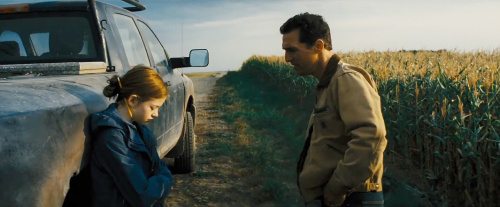
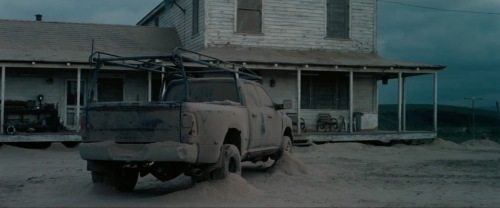
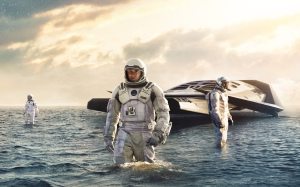
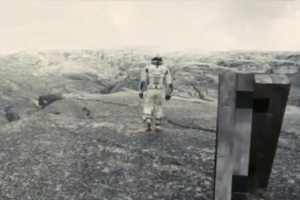
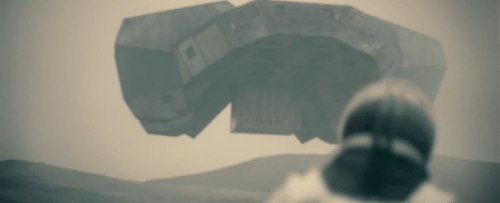
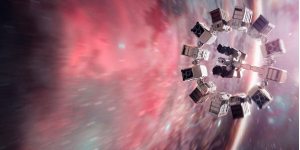
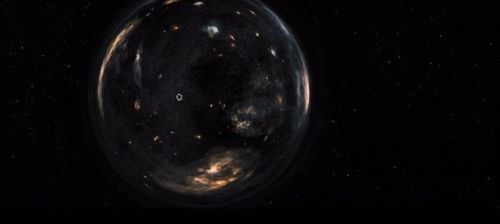

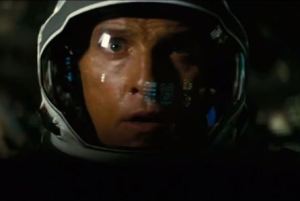
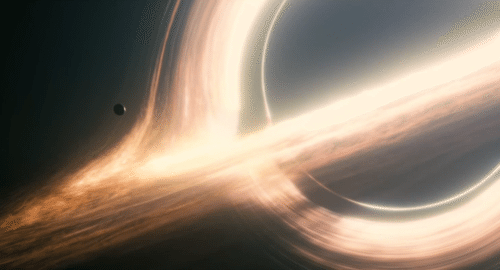
I did watch it last night, survived McConaughey’s monologues and dialogues, for which I almost needed a translator, not for subject matter but slurry speech, wondered about the human automatons of this era doing the things they were doing the way they were doing them and knew, I would NOT be doing them this way, none of them. I had some intense moments of awe at some visuals, although even those felt schizophrenic, sometimes delightful, often drab and second class, stopped trying to make sense of the keywords-only “scientific” explanations and left the cinema laaaate night feeling half full half empty …
It feels as though there was a good movie in there somewhere. Then again, maybe that good movie was called 2001.
Honestly, that’s it! Some movies should never be subject to remakes, improvements or even tributes. There seems to be a certain kind of arrogance in modern days’ filmmakers believing that their technological superiority would lend to improved remakes of classics. I still need to see one to believe it.
I’m kinda shocked that I hated this movie more than you did. I was actually really mystified: How could a talented director look at that script and say “Yes! I’m going to spend years of my life and several hundred million dollars to bring THAT to the screen!” There were some cool visuals in it. They were interspersed with long, interminable stretches of total stupidity. Like, blatant stupidity. Even if it’s your baby, you have to look at that script and say “My baby is ugly and stupid.”
I won’t even get into all of the things that were immensely stupid. Except for the whole thing where humanity’s last hope involved being technologically advanced enough to travel billions of light years through a wormhole, but not quite enough to take long-range (or short-range) observations of planets to learn anything about them. Apparently. Because the best way to figure out if a planet is habitable is to use all your fuel to land there and check it out! (Even Captain Kirk almost always had a better plan than that. Or at least some kind of excuse.)
The only thing I liked was the exploration of relative time. But if you want something that does that much, much more artfully, check out The Forever War by Joe Haldeman (if you haven’t).
http://www.amazon.com/gp/product/B005BVM9YI?btkr=1
The Forever War is pretty awesome. And, also, I think being developed into a film. Which will likely suck.
Ridley Scott tho I think, so maybe?
I think my overall impression leaving Interstellar was that I just didn’t care. It had some moments. It was dumb. But it didn’t make me actively mad.
Everyone should just go see Nightcrawler instead.
Quick! Name the last good Ridley Scott film…
Oh, I got it! It’s, um, wait. Damn! Thought I had it. I’ll get back to you in another three years.